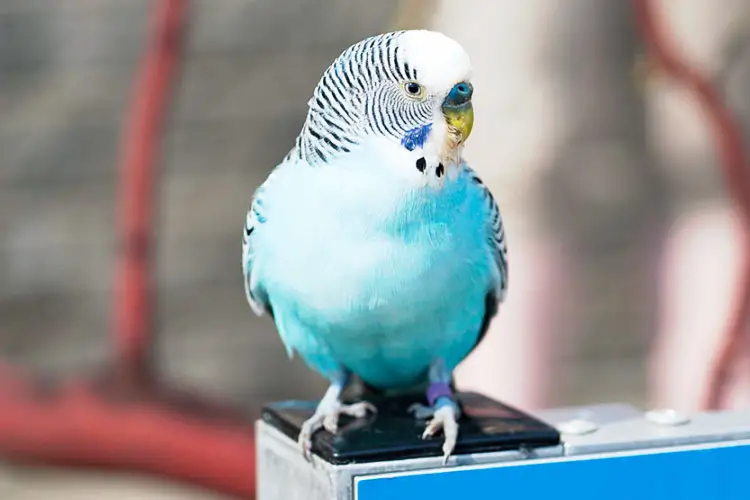Your worst nightmare as a budgie parent is when your budgie becomes ill. It can be difficult for new budgie owners to determine whether their new pet is simply scared or sick. When your budgie begins to pant, it is one of the telltale signs of illness or fear.
Why is my budgie panting? Your bird may be panting due to environmental changes, fear, respiratory infections, temperature fluctuations, or even exercise. The budgie may be sick if the panting is accompanied by other symptoms such as sneezing or nasal discharge.
Obesity and overheating are two other causes of panting. As a budgie owner, you must quickly determine the cause of the panting and then act promptly to correct the situation. This article will detail what causes a budgie to pant and what you should do if your budgie is panting.
Why Is My Budgie Panting?
Budgies sometimes pant, which should not always be a cause of alarm. As a new budgie parent, it may seem like it is not normal, but it is. So now, to answer the question that every budgie owner asks- why is my budgie panting?
Budgies do not have sweat glands, so they lose excess heat through panting. You may notice that after playing or exercising, the budgie will pant because it is trying to cool itself. Also, in warm seasons, budgies will pant just to lose heat.
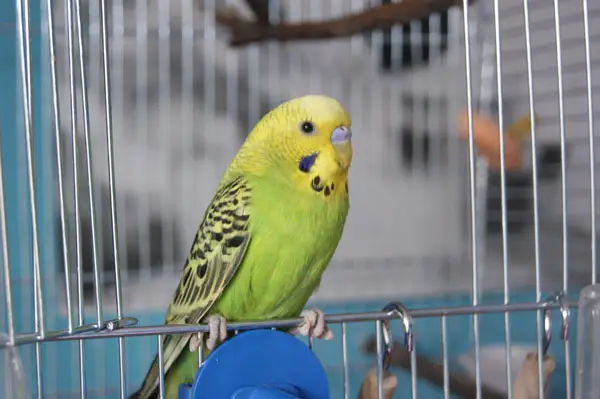
You should only worry if the budgie is excessively panting or constantly panting. Excessive panting may be accompanied by distress, sluggishness, or heavy breathing.
How Do I Know My Budgie Is Panting?
A budgie that is experiencing excessive panting has the following signs.
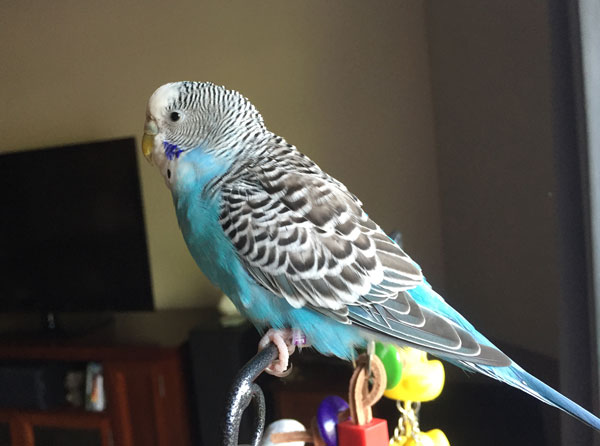
The budgie;
- Breathes through its mouth with its beak open while the tongue is out.
- It might have flared nostrils.
- Has ruffled feathers.
- Spends all its time at the bottom of the cage.
- Produces wheezing sounds when breathing.
- Breathes rapidly while tail moves up and down.
- Produces unusual noises.
- Droops its head all the time.
- Vomits and refuses to eat.
If you notice these signs, take your bird to a veterinarian.
What Is Causing My Budgie To Pant?
Budgies pant because of various reasons. They include;
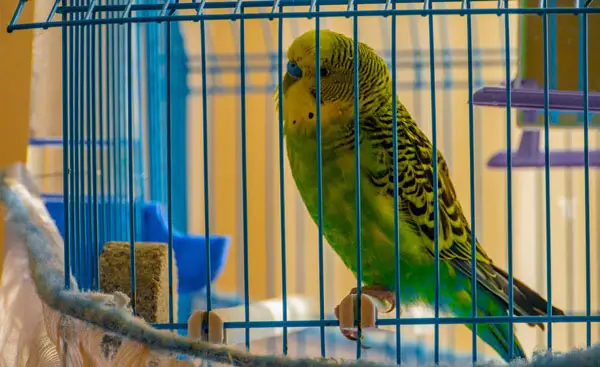
1. Fear
Budgies are prey birds, and they are accustomed to being in fear of predators in the wild. So, even in captivity, they tend to be very easily spooked. Some triggers that might frighten budgies are;
- The presence of predators,e.g., cats and dogs.
- Loud noises around their vicinity or outside; a predator bird making noise outside the house.
- New environment; a newly owned budgie tends to be scared for the first few days.
- Night fright; mainly occurs when budgies are sleeping and unexpectedly hear noises. Budgies experience rem sleep, so they are capable of having dreams. In case of nightmares, they may wake up when scared.
- Thunder and hailstorms.
How To Know That Your Budgie Is Scared?
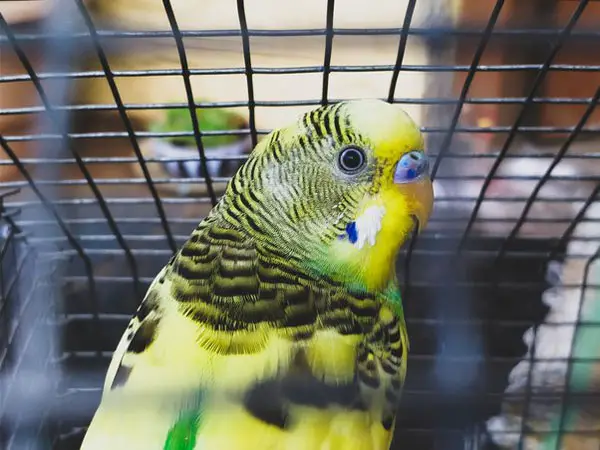
These are the tell-tale signs of a scared budgie;
- It may be excreating watery poop now and then.
- Rapidly panting.
- Flying around its cage restlessly.
- Standing at attention with eyes wide open.
- Hiding behind its food bowl.
- Its feathers seem flat.
2. Illnesses
When budgies are ill, they may pant—respiratory infections, sinus infections, allergies, colds, cancer, or even tumors. A budgie may also pant due to pain.
Budgies have thin lung membranes, which may make them susceptible to allergens such as dust, smoke, pollen, chemicals,e.g., cleaning supplies, and strong fumes, e.g., strong perfumes and paint.
How To Know Your Budgie Is Ill?
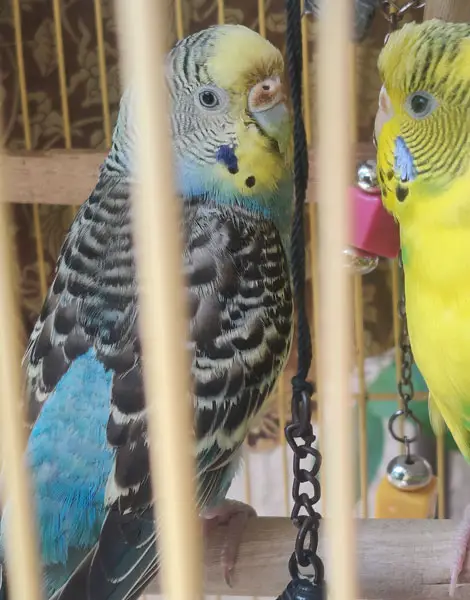
A budgie with a disease may showcase the following signs;
- Nasal congestion.
- Runny nose.
- Watery eyes.
- Ruffled feathers.
- Wheezing sound when breathing/coughing.
- Closed eyes.
- The budgie does not perch and frequently stays at the bottom of the cage.
- Sneezing and panting.
- Loss of appetite and loss of weight.
If your budgie showcases any of these signs, you should take it to a vet so that it can be treated.
3. Stress
Budgies are creatures of habit and do not respond well to change. Panting is a typical stress response; you could observe a budgie heaving up and down so that it can relax.
What Causes Stress To A Budgie?
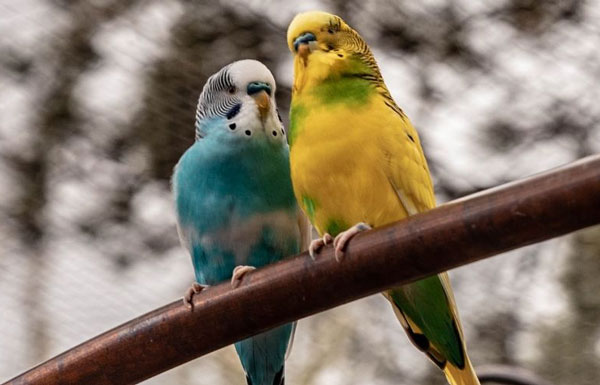
- When budgies are released from their cages, they tend to pant because they go into new surroundings they are not generally used to.
- Another cause of stress could be a budgie moving to a new home; budgies become anxious about new environments.
- If you change the color of the room the budgie lives in, move the budgie to a new cage, or add new toys or perches in its cage.
- Boredom may also cause anxiety to birds, so ensure there are swings and toys for the budgie to engage with. You could also bring in another budgie, so it is not lonely for your budgie when you are away.
- Sudden loud music or noise can also cause stress for budgies. They are susceptible to loud noise.
- If the cage is too squeezed.
4. High Temperatures
Budgies prefer warm temperatures; it should not be too hot or too cold. Budgies tend to be sensitive to even the slightest temperature change. In case of temperature rises, the budgies will pant as a way to lose excess heat.
However, if the budgie is panting excessively, that might be a reason to worry. Overheating could lead to a budgie experiencing heat stroke. Heat stroke occurs when the budgie is unable to cool itself. The following are situations that could lead to a budgie overheating;
- If you leave your budgie out in direct sunlight for an extended period.
- By keeping your bird next to a heat source for a long time.
- Obese birds overheat mostly during warm months because they cannot lose heat quickly due to all the fat in their bodies.
- If you leave your budgie in a car with poor ventilation.
- You may mean well by providing additional heat during cold months, but the extra heat may be too much for your budgie, leading to overheating.
- If there are too many budgies in one cage.
- If you place the budgie’s cage in a room with no ventilation.
How To Know That Your Budgie Is Overheating
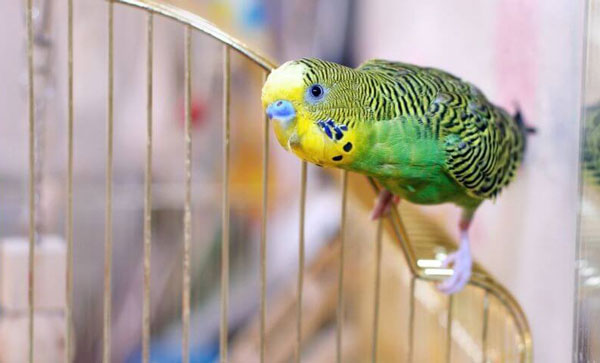
The following are signs that your budgie is overheating;
- Excessive panting; the budgie will try to breathe with its mouth open to cool itself.
- The budgie keeps its wings away from its body.
- Ruffled feathers; budgies ruffle their feathers to let air pass between their wings. This helps them feel calmer.
- If your budgie keeps tilting its head, budgies do this due to distress.
- Restlessness; the budgie keeps trying to escape from its cage.
- If your budgie sleeps more than usual.
- The budgie keeps yawning; research shows that yawning is a thermoregulatory action done by budgerigars.
5. Excessive Exercises
It is natural for any animal or human to pant after they exercise. Budgies require exercise in their day-to-day life. However, ensure the exercises do not become too strenuous because they could raise the budgie’s temperature rising, thus causing overheating.
Ensure you give the budgie breaks between your play sessions; that way, it will have time to rest before continuing playing.
Also read: Do Budgies Need Darkness To Sleep?
How Do I Stop My Budgie From Panting
Some fast measures could help your budgie stop panting, but if they do not, take it to a vet. Here is what you can do to prevent your budgie from panting.
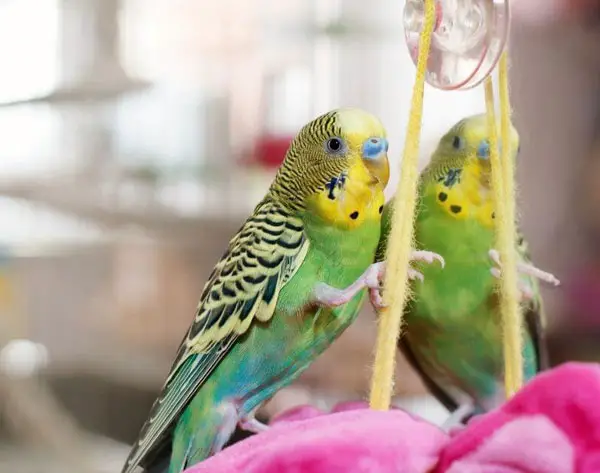
Shade:
When your budgies are outside, ensure they are not under direct sunlight. Put their cage in a position where half of the cell is in sunlight and half of it is under the shade.
Control Room Temperature:
If you keep your budgie in a room with an unregulated temperature, it could be suffering from heat stroke. So the first thing you do is move the budgie to a cooler room where temperatures are lower.
Ensure the room you keep your budgies has a temperature of 70-76 degrees Fahrenheit. That is the ideal temperature for budgies. You could add fans during warm seasons.
Conducive Environment:
As I previously stated, stress can cause budgies to pant because they are scared or nervous. Avoid playing loud music around them. If you remove your budgie from its cage and it seems stressed, put it back immediately.
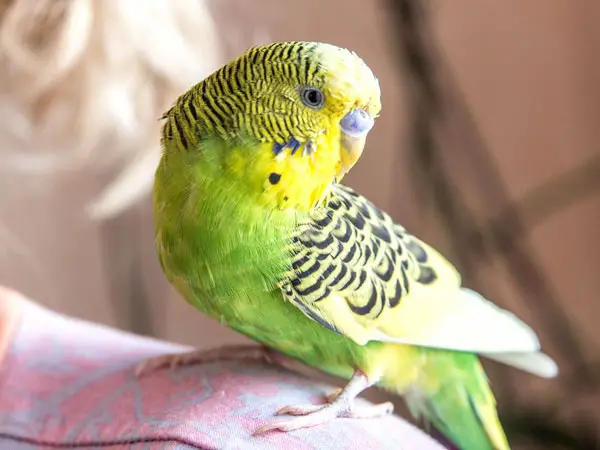
Cooling Methods:
You can employ cooling methods such as spraying your budgie with cold water during warm seasons. Providing your budgies with a bird bath, especially when you are not home, will help them cool themselves.
Less Triggers:
Ensure your budgies are in a calm environment and no other pets such as dogs or cats are in the same vicinity.
Related Questions
Here are other frequently asked questions.
In case the panting is due to heatstroke, you should put your budgie in front of a fan and try spraying it with cool water. Do not suddenly pour cold water on the budgie because that could cause shock. If the panting persists, call a veterinarian immediately.
Breathing fast is a sign that your budgie is panting. Try finding out what is causing the budgie to pant and take the necessary steps to correct the situation.
Related: Do Budgies and Cockatiels Get Along?
Conclusion
Panting is not always a sign of illness; it can be due to strenuous exercise or the budgie trying to lose heat on a hot day. However, you should take excessive panting seriously and employ measures to help your budgie from panting.
Contact a veterinarian immediately if you cannot get the budgie to stop panting. So, in regards to the question, why is my budgie panting? You now have the answers you need.
